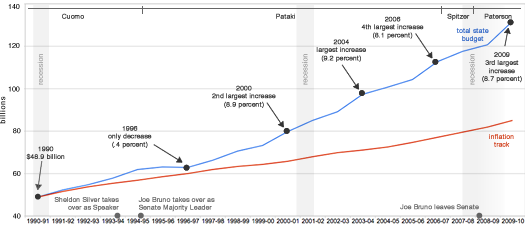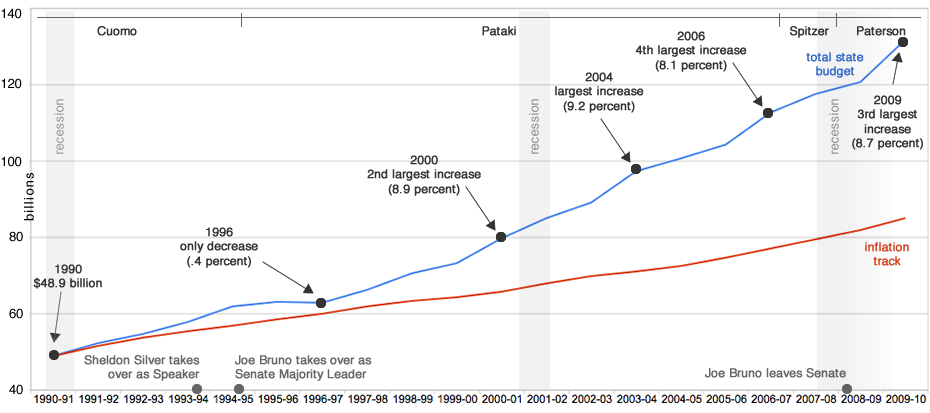The state budget gets bigger and bigger and...

There's a much bigger and easier-to-read version.
We were a little taken a back when we saw Monday morning that this year's total state budget is shaping up to be almost $132 billion. All we'd been hearing about was how there was no money -- and yet this year's budget is almost 9 percent bigger than last year's.
As it happens, we shouldn't have been surprised. At all. New York's total budget has been on this path since the late 1990s. Almost any budget is going to grow over time because of inflation. But even when you consider inflation, New York's total budget has been skyrocketing.
We've put together an annotated chart comparing the growth of the total budget to the track of inflation. It's kind of shocking laid out like that.
Discussion, notes and caveats after the jump.
How we made this chart
We started with the total budget number for the 1990-91 fiscal year ($48.9 billion). From there we charted the historical growth of the budget each year (blue line) vs how that number would grow if it only followed the inflation rate (red line).
Historical notes
1996: The only decrease during the last two decades came from a budget that 3.5 months late.
2003: The biggest increase during this period came from process of which the NYT wrote that Governor Pataki "lost control of this one in stunning fashion."
Caveats
+ There's nothing special about 1990-91 other than the fact that it was 20 years ago. It's not like that was ideal budget number or anything. We just had to start somewhere.
+ Inflation can be tricky to calculate and there are different ways of doing it. The inflation track we used was calculated with Tom Halfhill's inflation calculator, based on retail price inflation.
+ We used the size of the total state budget, which includes money passed along by the federal government. Another way of looking at this would have been to chart the amount of money the state has direct control over (that data is here).
+ In some ways, it's not totally fair to compare the state budget to general retail inflation. A big portion of the state budget goes to Medicaid costs, and health care costs have been increasing much faster than inflation over the last two decades.
+ We used data compiled by the AP from the state Division of the Budget (that list is here) and and we also pulled info from archived media reports.
+ It's very possible we've made mistakes/could have represented things better. We welcome corrections.
Say Something!
We'd really like you to take part in the conversation here at All Over Albany. But we do have a few rules here. Don't worry, they're easy. The first: be kind. The second: treat everyone else with the same respect you'd like to see in return. Cool? Great, post away. Comments are moderated so it might take a little while for your comment to show up. Thanks for being patient.

Comments
Moving out of NY is looking more and more appealing. I used to see the benefits but they are starting to be horribly overshadowed by the downfalls on the State.
... said Emma on Mar 31, 2009 at 1:09 PM | link
While the comparison with inflation is very welcome to show that the value of the budget dollar changes, what might be more telling is how the size of the state budget varies with New York's GDP. If New York's budget has tripled in 20 years but its GDP has increased tenfold during the same time period, that might not be such a bad thing.
(But, I have a hunch I know how that story ends.)
... said James Cronen on Mar 31, 2009 at 1:52 PM | link
If they're trying to save money so we get out of the recession, they are going the wrong direction!
... said Kari on Mar 31, 2009 at 1:57 PM | link
@James: Good point! Hmm...
... said Greg on Mar 31, 2009 at 2:17 PM | link
I love the "share the pain" argument given by the speaker, Working families etc. I agree with that on many levels. BUT, where is the sharing of the pain from the state government people. Could someone show me one state agency that is sharing the pain?
... said hrgreen on Mar 31, 2009 at 3:07 PM | link
@hrgreen:
The state is sharing the pain. As its citizens become less well-off, the state has to pick up the slack. States have to watch their tax revenues plummet while shelling out more for welfare and unemployment insurance payments. And most states constitutionally mandate a balanced-budget, so states can't create debt in the same way the federal government can.
... said James Cronen on Mar 31, 2009 at 3:58 PM | link
I don't know about other state agencies, but I do know that at mine attrition has been in effect for over year and the result is that as staff depart, those tasks are taken over by the remaining employees, putting many people in the position of doing the work of two or three people for no increase in pay. It also means that promotion opportunities are nonexistant, a fact I'm all too aware of as I got a 100 on an exam and can't get a better job no matter how many interviews I go on since nobody actually has a voucher to fill the position -- but I have discovered I look great in a suit, so there's that.
I mean, that's aside from the point that most state employees are part of that middle class working family demographic, sharing the pain in that way. But I hear you, indignantion is so fun!
... said B on Mar 31, 2009 at 4:34 PM | link
@James Cronen I agree with your comment, if I understand it - which is entirely possible that I missed your point, however, what I was asking is were is the corresponding cut backs in actual state budget to help off set the decline in revenue. As far as I can tell there is an real growth in this budget. So no one in the State Government is going to lose their job, take a pay cut, be forced to retire - real pain, the same kind of pain that the citizens and taxpayers and receipients of welfare are experiencing... Im not asking for tit for tat, I am asking for real management not BS management double talk management.
... said hrgreen on Apr 1, 2009 at 10:34 AM | link
Doesn't Colorado already do this? Might be interesting to see how it's impacted their state.
... said Fred on May 5, 2009 at 9:01 PM | link
@hrgreen - heave you not heard about those layoffs coming down the pike? Or the group of non-union employees that aren't getting their raises or cost-of-living-adjustments?
... said Jay on May 6, 2009 at 9:41 AM | link